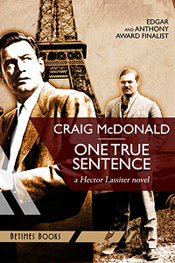 Ask twenty different authors
Ask twenty different authors what they think about the relative importance of research for a novel, and you’ll get twenty different opinions. On one side of the scale, some will say it’s irrelevant and that people read for good writing, not good research, and that water-tight fact-finding will never overcome bad prose.
I’m on the other side of the scale. Yes, the writing comes first, but nailing the details only adds to the effect. There is no downside. Not bothering to conduct rudimentary research into the subject matter, in my mind, is insulting to the reader. It smacks of laziness, especially if the reader has some grasp of the subject. In fact, as a reader myself I can only get so far in a book if the information blatantly conflicts with the facts that I know. I’m not asking anyone to be an expert, but at least show me you can find Wikipedia. Or buy a Guns and Ammo magazine. I’ll forgive almost anything if the author shows me he tried.
Because of this, I’m rabid about research. The knowledge base I gained from my previous career is absolutely essential as a starting point, but I don’t have an encyclopedic memory. Suffice it to say, I have to do an enormous amount of fact checking, from something as minute as how long a certain flight would take and the time-zones involved to whether a particular weapon fires from the open-bolt position. Invariably, whenever I try to wing it based on my memory and experiences alone, I find out I’m wrong. I’ve learned to fact-check just about everything. Luckily, if I can’t find the answer on my own, odds are very good that I know someone who can.
There is a trap with this, and I’ve fallen into it more times than I can count, and that is you want to show off the research you’ve done, babbling on about interesting but irrelevant tidbits, with the plot suffering as a result. I’ve just come to understand that out of all the research I do, only about two percent will make it into the book. Especially when talking about locations.
I’m a little bit of a perfectionist when it comes to real-world settings, and I research them relentlessly. I’ve traveled all over the world, which is a good thing when I want to describe a setting, but make no mistake; I have to really study locations to get them right. For example, I’ve been to both Central and South America, but I have never been to Guatemala or Belize, major settings in
One Rough Man. I had to research both forever, and ultimately didn’t use 99% of what I found. In the end I’m sure that someone who’s actually spent some time there will find flaws in my descriptions. I’m okay with that, because I gave it my best shot.

When I have the ability to do first-hand research, I do so. The Atlanta airport scene is a pretty good example of that. Basically, Jennifer and Pike get stopped at customs and have to break out of the secondary interrogation facility. I tried to write how they would evade capture, and escape what’s become one of the most secure areas since 9/11, using my own recollection of the airport. When I was done, I realized that I really didn’t know enough about the security of the airport, and that the way I had written it was a little hokey. I have been through that airport probably 500 times, but I’d never looked at the security from an evasion standpoint. One thing I was convinced of, though, was they weren’t going to escape by using normal passenger corridors. I called up some pilot friends of mine and proposed a simple question: how can I get out of the Atlanta airport without going the usual passenger route? They gave me the breakdown of what crew members do, to include locations of employee lounges and employee bus routes. From there, I simply flew to the airport and retraced Pike and Jennifer’s steps from customs, noting the security in place such as cameras, alarms, and checkpoints. After casing the place it was pretty easy to figure out how they could do it.
Since I’m not independently wealthy, I couldn’t afford to do what I did with the Atlanta scene for the scenes in Bosnia, Oslo, or Guatemala. In those cases, I had to rely on the internet, my memory and friends with specialized knowledge. There’s a military phrase called Open Source Intelligence, which basically means, “read the paper and see what you can find out”. In today’s times, that means the internet, and it’s amazing what’s out there, from airport databases and flikr, to Google Earth and 360cities. Surprisingly, my favorite source is a blog from backpacking college students. Those folks go
everywhere, and talk about everything from security at border crossings to the best way to get a taxi, complete with pictures. Suffice to say, just about anything can be found if one looks hard enough.
For instance, I’ve been inside the White House situation room – once – but I’m certainly not well versed on the White House floor plan, something I needed to be if Kurt was going to keep seeing the president. Obviously, getting in and stomping around the president’s personal space was problematic. Luckily, there’s an entire website dedicated to the history of the White House, complete with the floor plan through the years and photos.

I try to do that with any scene I write, but I’ll be honest, if I need something, I’ll create it. For instance, the Four Courts pub where Pike is ambushed is a real location in Clarendon, Virginia. The streets around it are accurate, as are the Metro stops to get there. I cased that area as well, trying to figure out how I would ambush Pike (and get a Guinness at the pub). I planned the ambush realistically, but added an alley to the left of the pub. It doesn’t exist in real life, but it does in my book. I know that sounds hypocritical, but I did this because in the end the writing
does come first. The alley was critical to the story.
I’ll fake things for reasons other than the story as well. Writers without my background can guess how widget X works, and if they get it right everyone wonders how they got the information. My problem is the opposite: I
do know how things work, and most of that knowledge is classified, so I have to spend a lot of time tempering what I know when I write, even if it seems mundane. For instance, I’m currently working on a scene for book two where terrorists attack an Army Ammunition Supply Point. I traveled to and studied the ASP, then simply wrote how I would hit it to get to the ammunition inside. After I was done, I read it and thought, “What the hell are you doing? You’ve just written a blueprint on how to attack a U.S. Federal facility!” My insider knowledge, coupled with my tactical skill set, had made it
too real. I had to go back and throw in some red herrings. I know I’ll get dinged on that by someone with the same knowledge as me, saying, “That would never work,” but that’s the point.
“Brad Taylor has created a feisty, devil-may-care hero in Pike Logan, a man forced to race not only time, but his own shadowy instincts. A coiling plot, crisp writing, and constant braids of suspense make One Rough Man one exciting debut.”
—Steve Berry, New York Times bestselling author
In the end, I fall on the “research” bandwagon, although I realize there’s no way I’m going to be perfect. Mistakes
will happen, no matter how much research I do, and I want to kick myself when that occurs, but it’s just the way of writing. Pike steals a Chevy Cutlass in Guatemala City to escape, and after all of the research on the city itself, I’m told by an advanced copy reader – after I’d blessed the final manuscript – that Chevrolet didn’t make the Cutlass. Oldsmobile did.
Mistakes like that don’t make me throw my hands up at the futility of it all, because I owe it to the reader. My cut-line on real versus make-believe is the story itself. If you make something up for the purposes of the plot, knowing it’s wrong, and it makes the story stronger, then you’ve enhanced the enjoyment of the reader. On the other hand, using the story as an excuse for a lack of research is really just a shortcut – and the reader will know it. Maybe not all readers will care, but even if only one does, you’ve failed.
 Brad was born on Okinawa, Japan, but grew up on 40-acres in rural Texas. Graduating from the University of Texas, he was commissioned as a second lieutenant in the U.S. Army Infantry. Brad served for more than 21 years, retiring as a Special Forces Lieutenant Colonel. During that time he held numerous Infantry and Special Forces positions, including eight years in 1st Special Forces Operational Detachment – Delta where he commanded multiple troops and a squadron. He has conducted operations in support of US national interests in Iraq, Afghanistan, and other classified locations.
Brad was born on Okinawa, Japan, but grew up on 40-acres in rural Texas. Graduating from the University of Texas, he was commissioned as a second lieutenant in the U.S. Army Infantry. Brad served for more than 21 years, retiring as a Special Forces Lieutenant Colonel. During that time he held numerous Infantry and Special Forces positions, including eight years in 1st Special Forces Operational Detachment – Delta where he commanded multiple troops and a squadron. He has conducted operations in support of US national interests in Iraq, Afghanistan, and other classified locations.
His final assignment was as the Assistant Professor of Military Science at The Citadel in Charleston, SC. He holds a Master’s of Science in Defense Analysis from the Naval Postgraduate School, with a concentration in Irregular Warfare. When not writing, he serves as a security consultant on asymmetric threats for various agencies. He lives in Charleston, SC with his wife and two daughters.
Visit his website at www.bradtaylorbooks.com
Brad Taylor will be signing his Debut novel ONE ROUGH MAN at The Poisoned Pen Thursday, February 24 at 7pm.
The event will also be webcast live and archived for later viewing. Just click the Webcasts tab. Order a copy of ONE ROUGH MAN by clicking here!
















